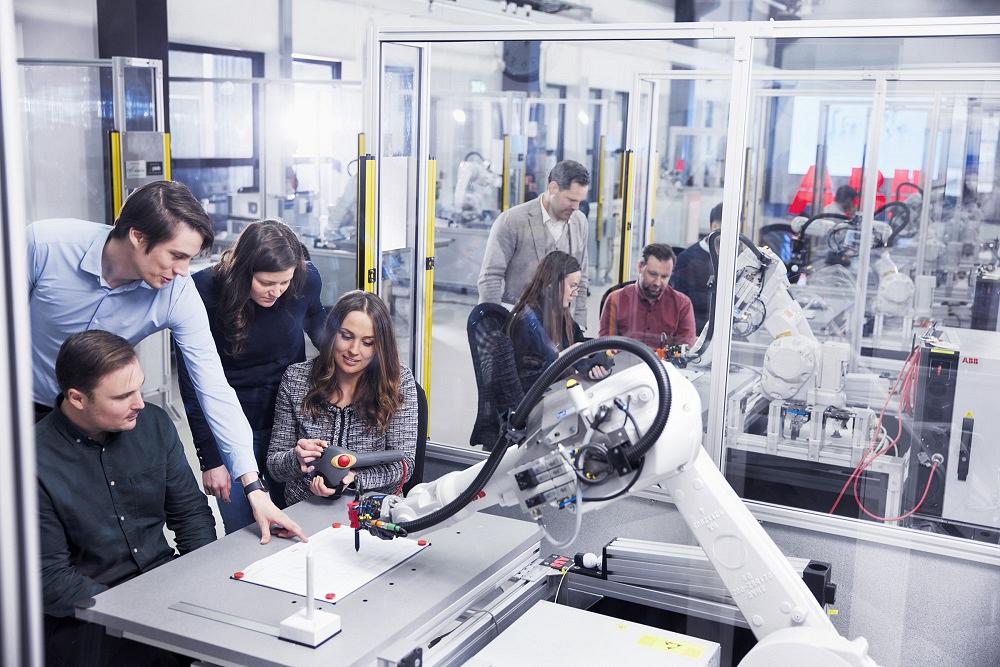- FMA
- The Fabricator
- FABTECH
- Canadian Metalworking
Categories
- Additive Manufacturing
- Aluminum Welding
- Arc Welding
- Assembly and Joining
- Automation and Robotics
- Bending and Forming
- Consumables
- Cutting and Weld Prep
- Electric Vehicles
- En Español
- Finishing
- Hydroforming
- Laser Cutting
- Laser Welding
- Machining
- Manufacturing Software
- Materials Handling
- Metals/Materials
- Oxyfuel Cutting
- Plasma Cutting
- Power Tools
- Punching and Other Holemaking
- Roll Forming
- Safety
- Sawing
- Shearing
- Shop Management
- Testing and Measuring
- Tube and Pipe Fabrication
- Tube and Pipe Production
- Waterjet Cutting
Industry Directory
Webcasts
Podcasts
FAB 40
Advertise
Subscribe
Account Login
Search
ABB survey reveals re-industrialization at risk from global education gap in automation
- September 13, 2022
- News Release
- Automation and Robotics
A global ABB survey has revealed a growing trend in U.S. and European businesses toward reshoring or nearshoring operations to build resilience in the face of global challenges—along with a significant education gap in the skills necessary for these strategies to succeed.
“The world is constantly evolving—businesses are shifting existing structures and adopting new technologies to future-proof their operations for a variety of challenges and uncertainties, with robotic automation playing a key role,” said Sami Atiya, president of ABB’s Robotics & Discrete Automation Business. “We need significant investment in continuous education to prepare our existing and future workforce to thrive in an age of robotics and automation, important not only to prepare for the widespread shifts we are seeing, but to create prosperous societies going forward.”
ABB’s 2022 survey of U.S. and European business leaders revealed that 74% of European and 70% of U.S. businesses are planning to re- or nearshore operations to build their supply chain resilience in response to labor shortages, the need for a more sustainable global footprint, and global uncertainty.
Most of these businesses view automation as the enabler of these shifts, with 75% of European and 62% of U.S. businesses surveyed planning to invest in robotics and automation in the next three years to facilitate this shift in operations.
Despite this appetite for automation, ABB’s 2022 global education survey found a significant gap in the education and training needed to ensure the skills necessary for work in the increasingly connected and automated workplaces of the future. Of the global education professionals surveyed, 80% believe robotics and automation will shape the future of employment in the next 10 years, while only one in four education institutions currently use robots as part of their teaching programs.
Related Companies
subscribe now

The Fabricator is North America's leading magazine for the metal forming and fabricating industry. The magazine delivers the news, technical articles, and case histories that enable fabricators to do their jobs more efficiently. The Fabricator has served the industry since 1970.
start your free subscription- Stay connected from anywhere

Easily access valuable industry resources now with full access to the digital edition of The Fabricator.

Easily access valuable industry resources now with full access to the digital edition of The Welder.

Easily access valuable industry resources now with full access to the digital edition of The Tube and Pipe Journal.
- Podcasting
- Podcast:
- The Fabricator Podcast
- Published:
- 04/16/2024
- Running Time:
- 63:29
In this episode of The Fabricator Podcast, Caleb Chamberlain, co-founder and CEO of OSH Cut, discusses his company’s...
- Trending Articles
Tips for creating sheet metal tubes with perforations

Are two heads better than one in fiber laser cutting?

Supporting the metal fabricating industry through FMA

JM Steel triples capacity for solar energy projects at Pennsylvania facility

Omco Solar opens second Alabama manufacturing facility

- Industry Events
16th Annual Safety Conference
- April 30 - May 1, 2024
- Elgin,
Pipe and Tube Conference
- May 21 - 22, 2024
- Omaha, NE
World-Class Roll Forming Workshop
- June 5 - 6, 2024
- Louisville, KY
Advanced Laser Application Workshop
- June 25 - 27, 2024
- Novi, MI


























